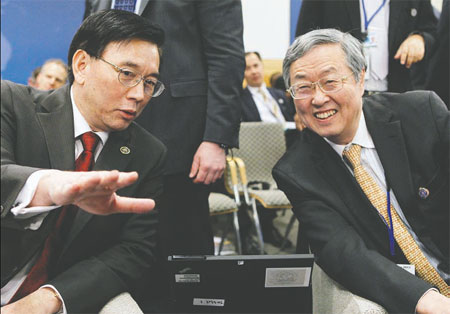PBOC governor urges speed in approving changes to IMF
|
Zhou Xiaochuan (right), governor of the People's Bank of China, talks with Lin Jianhai, International Monetary Fund secretary, before the International Monetary and Financial Committee meeting during the World Bank and IMF spring meetings in Washington on Saturday. Molly Riley / AP |
China's central bank chief urged "relevant" countries to ratify reforms intended to increase the power of China and other emerging-market countries at the International Monetary Fund, as it and the World Bank concluded their spring meetings on Sunday.
Zhou Xiaochuan, governor of the People's Bank of China, said in a statement to the Fund's International Monetary and Financial Committee, which sets internal structures and policies, that he hoped a new round of IMF quota reviews would be completed by January 2014. The committee met during the semiannual weekend session of the IMF and the World Bank in Washington.
Countries that haven't yet ratified the IMF's quota-andgovernance reforms should do so as soon as possible, Zhou said.
In December 2010, the IMF's Executive Board approved a plan to change voting allocations that would give emerging-market and developing countries greater say in how the Washington-based lending agency is run. The IMF can be a lifeline to any of its 188 member governments in times of financial distress by providing advice and loans conditioned on changes in fiscal policies.
Under the plan, the quota available from the IMF to assist countries would increase significantly, to 476.8 billion "special drawing rights", or about $720 billion based on newly empowered countries' currency reserves, from the current 238.4 rights.
Emerging-market and developing countries would absorb 6 percent of the existing quota from developed nations. For China, the quota is set to increase to 6.4 percent from just under 4 percent, while voting rights go to 6.1 percent from 3.8 percent, making it the third-biggest member in IMF quotas, after the United States and Japan.
Also, Western European countries are to give up two seats on the 24-member Executive Board, which governs day-to-day operations of the IMF.
The plan requires approval of Fund members that collectively hold 85 percent of voting rights. The US alone has a 16.75 percent vote, making it nearly indispensable for any structural change.
US Treasury Secretary Jacob Lew asked the House of Representatives Budget Committee to approve the plan for increasing the IMF's resources and said US veto power at the Fund wouldn't be threatened by the proposed structural changes.
The plan containing those changes, however, isn't included in the Treasury Department's budget request for the US government's current fiscal year, which ends on Sept 30.
Other emerging-market countries have expressed dissatisfaction with the slow progress in Congress and the parliaments of some European countries in the IMF.
Brazil's Finance Minister Guido Mantega on Friday accused the US and Europe of stalling.
"America is unable and Europe unwilling to follow through with agreed reforms. The institution's major shareholders are gambling, perhaps unwittingly, with the IMF's legitimacy and credibility," he said in a statement.
On Thursday, ministers of the Group of 24, which includes major emerging economies such as Brazil, India, Russia and South Africa, expressed impatience over the process.
The PBOC's Zhou also said on Saturday that European governments should moderate the pace of their spending cuts, particularly in the debtriddled euro zone, and make structural economic reforms to stimulate job creation.
"In the euro area, while policy commitments to defend the monetary union have been stepped up, much remains to be done. Specifically, fiscal consolidation needs to be carried out at an appropriate pace, and structural reforms, such as labor market reform, should be accelerated to strengthen competitiveness and growth," he said in his statement to the IMF.
The central banker also warned that loose monetary policy in large advanced economies could negatively affect those countries' trading partners.
"Policymakers in advanced economies should also be mindful of the spillover effects of these policies, such as more volatile capital flows, exchange rates, and commodity prices," Zhou said, adding that quantitative easing "could exacerbate the financial vulnerabilities and affect the stability of the international monetary system".
In addition, he said China's first-quarter economic growth was "within a reasonable band" and that the country will continue its "proactive fiscal policy and prudent monetary policy" this year.
From January through March, the world's secondbiggest economy grew 7.7 percent. That was lower than many economists had forecast, which aroused worry about the redounding of the Chinese economy.
In its World Economic Outlook, the IMF forecasts that the Chinese economy will grow by 8 percent this year, while the World Bank's estimate is 8.3 percent. In 2012, China's economy expanded by 7.8 percent, its slowest pace in 13 years.





















